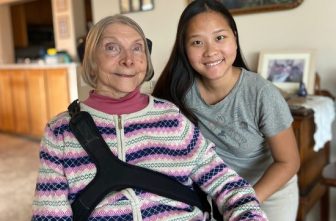
Falling is not a normal part of aging.
Yet, one in three adults 65 and older fall each year. In 2005 alone more than 1.8 million seniors were treated in emergency departments for fall-related injuries. The United States spends an estimated $20.2 billion annually for the treatment of fall-related injuries. The majority of the cost is for the treatment of hip fractures, which averages $35,000 per patient.
So, although falling is not “normal,” it’s happening often and it’s expensive.
The good news is that falls can be prevented. Simple adjustments to daily activities can greatly reduce the risk of a fall.
What is balance?
Balance is the body’s awareness of where it is in space. We rely on our eyesight, inner-ear functions and our joint and muscle awareness to maintain balance. If even one of those systems is slightly impaired, our balance is at risk.
Losing balance can be caused by a variety of factors. An ear infection, poor lighting, clutter in the house or a chronic disease can all cause a fall.
Sometimes, the loss of balance can be a symptom of another issue the body is experiencing. For instance, an individual may trip on a rug while rushing to get to a restroom, fall and twist an ankle. In this case, a doctor or a therapist may be more concerned as to why the person was rushing to the restroom, rather than the fall itself.
If a person is unable to balance standing on one leg for five seconds, they are at risk for a fall with injury.
The issue of balance can be complicated, but it doesn’t have to be. Individuals can be proactive about their general health and wellness to prevent a fall from occurring in the first place.
Preventing falls
One of the best ways to prevent a fall is to simply be aware of what the body is trying to communicate and what factors may increase the risk of a fall.
The following are four simple techniques to reduce the risk of a fall:
- Begin an exercise program to improve leg strength and balance.
- Ask a doctor or pharmacist to review all medications. Learn about the medications you are taking and understand the side effects.
- Get an annual eye exam and update the prescriptions.
- Review your home environment regularly to check for clutter and tripping hazards. Consider installing extra railings or grab bars.
Balance education
Fall prevention programming is a growing trend among many health care organizations.
Balance programs are available to not only treat the effects of a fall, but also to prevent a fall from recurring.
If you have a fear of falling or recognize you may be at risk for a fall, contact your physician and ask for a full balance assessment.
Falls are not a normal part of aging. Don’t let the risk of a fall slow you down. Be aware, and be proactive with your health.
Dehmer is a communications director at Saint Therese, which provides senior care and housing at locations in New Hope, Brooklyn Park and Shoreview. This month’s Catholic Senior Services article is provided as a service of Saint Therese, an affiliate of CSS. Visit catholicseniorservices.org or call the Catholic Senior Services Help Line at (877) 420-6461.




